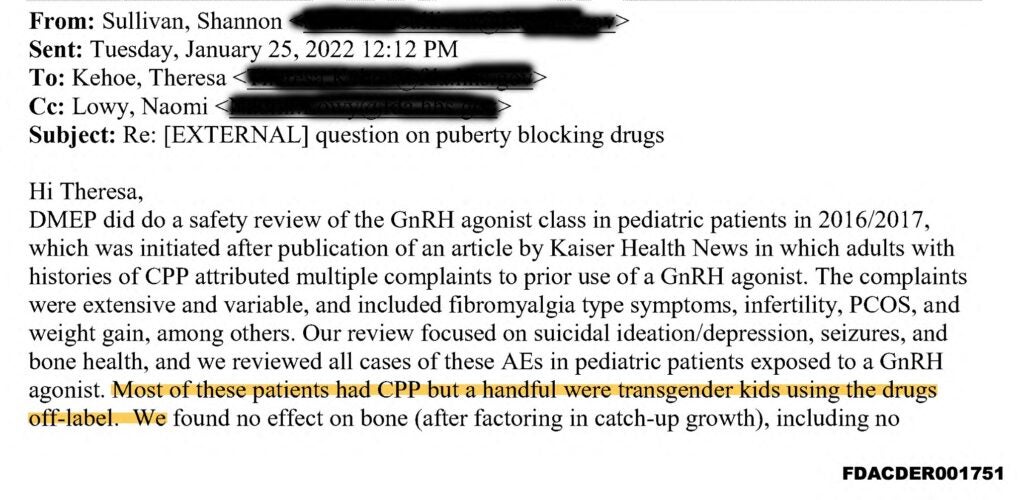FIRST ON THE DAILY SIGNAL—Former officials in the U.S. Department of Health and Human Services and the Food and Drug Administration condemned what they described as the FDA’s duplicity in allowing off-label use of so-called puberty blockers while loudly condemning the use of far safer drugs to treat COVID-19.
“During the Trump administration, the media falsely accused us daily of ‘politicizing America’s public health agencies.’ Yet the same media is now silent on [Vice President Kamala] Harris and [President Joe] Biden’s FDA’s anti-science, purely political insanity,” Brian Harrison, former chief of staff at HHS and now a member of the Texas House of Representatives, told The Daily Signal in a written statement.
“We’ve now learned that the same FDA that banned mothers from importing safe formula for starving babies and kept safe COVID treatments from patients was apparently pushing dangerous puberty blockers for kids,” Harrison added.
Shocking New Evidence
Harrison pointed to an email obtained by the conservative nonprofit America First Legal and published first by The Daily Signal.
In the Jan. 25, 2022, email, Shannon Sullivan, clinical team leader at the FDA’s Division of General Endocrinology, noted that the agency’s Division of Metabolism and Endocrinology Products performed a “safety review of the GnRH agonist class in pediatric patients in 2016/2017.”
GnRH stands for “Gonadatropin-releasing hormone.” GnRH agonists prevent the natural release of testosterone and estrogen that initiate puberty.
“Our review focused on suicidal ideation/depression, seizures, and bone health,” Sullivan wrote in the 2022 email. Although most of the minors in the study suffered from central precocious puberty (in which puberty starts too early), she said, “a handful were transgender kids using the drugs off-label.”
“We found no effect on bone (after factoring in catch-up growth), including no increase in fracture risk,” she noted. “We did find increased risk of depression and suicidality, as well as increased seizure risk and we issued [safety-related labeling changes].”
Yet, as The Daily Signal reported, Sullivan went on to recommend approving GnRH agonists for minors.
The FDA’s Division of Urology, Obstetrics, and Gynecology, she wrote, “has done a patient listening session with trans kids and separately with trans adults, which I participated in, and there is definitely a need for these drugs to be approved for gender transition, as they are typically not covered by insurance and are expensive out of pocket.”
Sullivan also said that “no company has come in” to provide “GnRH agonists in the transgender population” yet. However, she added, “it was my understanding” that the FDA division “would take these applications if and when they do come in.”

Transgender activists claim that minors who identify with the gender opposite their biological sex need experimental medical alterations such as GnRH agonists either to prevent puberty or to force their bodies to resemble the bodies of the opposite sex. Activists mask the nature of these interventions with the term “gender-affirming care” and insist that without these interventions, kids will commit suicide.
Roger Severino, former director of the Office of Civil Rights at HHS and now vice president of domestic policy at The Heritage Foundation, emphasized the contradiction between the rhetoric supporting “gender-affirming care” and the findings noted by the FDA’s Sullivan.
“HHS still claims puberty blockers for 12-year-olds are fully ‘reversible,’ seemingly oblivious to the fact that suicide is as irreversible as it gets,” Severino quipped.
FDA’s Duplicity on COVID-19, ‘Puberty Blockers’
David Gortler, a PharmD. pharmacologist and pharmacist who previously was a senior adviser to the FDA commissioner on policy and drug safety, raised the alarm about GnRH agonists for minors.
Gortler, a former Yale University professor, told The Daily Signal that the Food and Drug Administration is being “duplicitous” in how it uses its Adverse Event Reporting System (AERS), a database of reactions to certain drugs that users report to the FDA.
The FDA relied heavily on the reporting system’s data to declare that hydroxychloroquine was unsafe after finding only a few hundred reports of adverse events, he said, but the agency dismisses a considerably higher number of such reports for GnRH agonists.
“GnRH agonists account for 70,000 adverse reports,” Gortler said. “While these reports still need to be reviewed, it is a remarkable number of adverse events for what should be a niche, otherwise rarely clinically indicated, class of drugs.”
Yet the FDA often dismisses these reports as “not confirmed”; “not establishing causation”; “no definitive proof”; and “not establishing a rate of occurrence.”
Gortler, who has analyzed the data himself, showed that preliminary analysis to The Daily Signal. According to his analysis, AERS reports 70,000 adverse reactions to GnRH agonists, 2,510 of them involving children aged 14 or younger.
Adverse reactions include hallucinations, bone disorders, cardiac arrest, abdominal pain, migraine, mood alterations, a clot in the heart, pelvic pain, seizures, abnormal skin odor, blindness, and more. Among patients ages 4 to 13, a total of 21 had thoughts of suicide.
The AERS database includes 30 records noting the death of a patient between the ages of zero and 14 where a “puberty blocker” is the primary suspect drug.
These cases include a 10-year-old who died of a hemorrhagic stroke after taking Lupron, a brand of synthetic hormone, in March 2014; a 5-year-old who died of cancer reported in May 2022; an 8-year-old who died of liver failure after receiving leuprolide acetate, a synthetic drug, in March 2004; and a 14-year-old who “completed suicide” in April 2017.
“Even though this drug is objectively unsafe, they seem to be selectively turning a blind eye to it, seemingly in sync with White House messaging,” Gortler said, referring to FDA officials.
“At the same time,” he added, “the FDA selectively heavily involved itself in the off-label administration of ivermectin and hydroxychloroquine, both of which were relatively much safer than GnRH agonists, based on clinical studies, randomized controlled trials, AERS reports, plus other epidemiological findings.”
Where Do ‘Puberty Blockers’ Come From?
The former FDA adviser also told The Daily Signal that physicians developed GnRH agonists to help treat certain cancers that depend on estrogen or testosterone.
Removing estrogen and testosterone from cancer patients to prolong their lives makes sense, Gortler said, because it prevents the progress of an invasive, malignant disease. But giving these drugs to physiologically and genetically healthy kids is a completely different story, he said.
“This drug was tested, designed, and FDA-approved for use in an older, cancer-afflicted population,” Gortler said.
“The human body has around 100 trillion cells,” Gortler noted. “High school biology taught us that in each of those nucleated cells, there are either XX or XY chromosomes denoting a female or male sex, respectively. No drug or medical procedure will ever be able to fight 100 or so trillion cells, and trying to do so would be a fool’s errand.”
He compared “puberty blockers” to the outdated, dangerous custom of Chinese footbinding, in which a young girl’s feet would be tightly wrapped to keep them from growing naturally.
“Similarly, GnRH agonists block a normal, healthy development process from occurring,” Gortler said. “Just because it’s not something that isn’t directly and obviously visible doesn’t mean that it’s any less clinically, scientifically, or ethically dangerous.”
The FDA did not respond to The Daily Signal’s request for comment.
